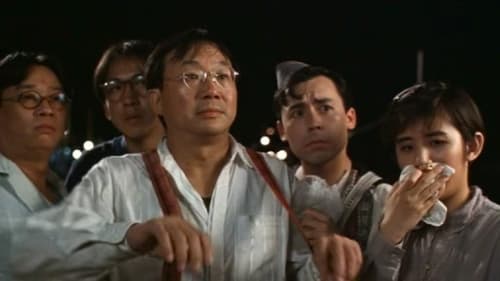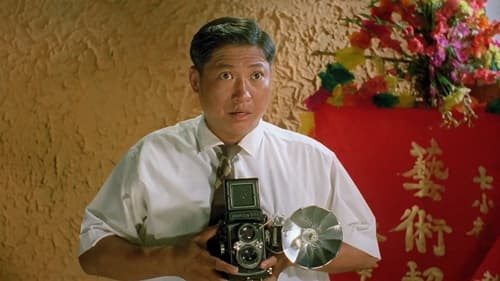
Editor
A Hong Kong family illegally emmigrate to the United States. The father eventually goes back to Hong Kong to raise more money but the wife and child stay behind. Several years have passed and the father legally comes back to be with his wife and child. Has his greatest fears been realized and his wife and child have been americanized?

Editor
Hero of the Beggars is a Hong Kong Comedy starring Chan Wai-Man and Michael Hui.

Editor
Этот фильм о законах, мастере Ю Джим Юэне и студентах Школы Китайской Оперы, которая наиболее известна как место учебы Джеки Чана, Саммо Хунга и Юэнь Бьяо.

Editor
A young woman of considerable social standing receives a curse from a black magician that causes her her head to detach from her body and attack anyone in sight. A good wizard is able to limit the effects of the curse to effect her only on the 15th of each month, but when she falls in love, things get complicated.

Editor
Kaiju film from 1982 period that appears to be sort of a Taiwanese variation of Clash of the Titans combining elements of Japanese monster movies, old school kung fu flicks, and a bit of horror.

Editor
A witch unleashes an army of killer cats on a village for burying her alive.

Editor
The Righteous Club of Chinese martial artists meet to drive out the evil Japanese invaders but first they must overcome their own personal differences.

Editor
Heavyset Master An (Got Siu-Bo) receives a message from a dying imperial messenger and finds himself to be the hunted due to the defining, powerful nature of the message. A reluctant hero and not a fighting swordsman at heart (his sword is bent and worn), he's defended by mainly a duo of females and a sneaky swordsman played by O Chun-Hung.

Editor
Rare martial arts film.

Editor
Taiwanese drama film.

Editor
The Golden Blade should be kept in the hands of a good person; if it fell into the wrong hands the outcome would be terrible. Evil Black Bat asked for the sword, but the sword smith refused the demand. The prentice hid the sword while his master got slaughtered by Black Bat and before his death asked his prentice to give the sword to Ting Yeh the son of Ting Hsiang Ren. Black Bat slaughters Ting Hsiang Ren and his family, while Ting Yeh was absent. Upon return to home, Ting Yeh finds out the tragic destiny of his parents. After recovering The Golden Blade he seeks vengeance.

Editor
Tzu Ch'iang and Yu Fen fall in love, however Tzu Ch'iang is married yet. One day, his wife comes back from the village. Yu Fen reveals the truth and goes away angrily. After seven years, she brings back their son to look for him and ask him to take care of their son. Unfortunately, everything is changed after happening of traffic accident...

Editor
After being abandoned in the mountains the lovey snow maiden seeks her revenge.

Editor
Centring on the legend of the four ancient Chinese heroines, the film was a novelty for audiences at the time, as the singing performance was in Cantonese and used huangmei operatic rhythms—a popular trend in the 1960s, yet it retained traditional flavours by using operatic luogu percussion in the battle scenes. ‘Movie-fan princess' Connie Chan Po-chu not only sings Cantonese song and huangmei tone solos in the film, she also wows the audience by taking up the doumadanrole for the first time as the Tang dynasty female general Fan Lei-fa, showing off her superb operatic martial skills, together with Shum Chi-wah, inherited from Peking opera master Fen Ju Hua. Yu Kai's weaponry prowess and renowned female comedian Tam Lan-hing cross-dressing as a male general are also brilliant in this gem.

Editor
A 1967 Cantonese language action film directed by Cheung Wai-Gwong, starring Connie Chan, Adam Cheng and Liu Chia-Liang. Ming-Wai & Ming-Sing, a brother and sister (dual roles played by Connie Chan) who must go undercover in a gang to rescue their uncle.

Editor
Ye Hui and Jiang Man were originally a loving couple. One time Hui received a 1000 dollar bonus, and his colleague Zhu Ge-Kong paid a plan to hide the bonus in the shoes and prepared to spend it on his own. After Man found out, he took the money away, and the two quarreled about it. , Hui asked for a divorce in anger, but he was not allowed to move away, so he only hung a tent in the bedroom as the "Chu River and Han Jie". After that, Huichang fought with his wife, even pretending to have brain cancer, and tricked Man into taking care of him. , Unexpectedly, it was seen through by Man again. Manager Hong of Hui Company and Manager Mei of Man Company reunited, and the two companies merged together, and Man promoted the director, making it difficult for Hui and Kong. After the manager of Man Demei persuaded him, he witnessed the affection of others’ husbands and wives. Deeply ashamed, reconciliation with Hui is as good as ever.

Editor
Middle Eastern folktale collection One Thousand and One Nights has been greatly treasured by Western storytellers who are fascinated by the fantastic world within. The exoticism conveyed in Western film adaptations greatly appealed to Cantonese opera and film writer Ma Si-tsang, who adapted The Thief of Bagdad (1924) into Cantonese opera The Prince of Thieves, set in an ancient empire influenced by both East and West. In 1958, director Luk Bong adapted the play into a film, turning the thief of the original film into a Robin Hood-esque hero who poses as a prince to compete for the princess' hand in marriage. Packed with a thrilling treasure hunt and a damsel-in-distress rescue as well as eye-catching special effects, Prince of Thieves is 100% a romantic swashbuckler.

Editor
After seeing a friend of his boss' son adopted over his promised promotion with connections, Shrimp's father, a minor white-collar worker Ng Kwun-sing, vows to get Shrimp a place in a prestigious school and a chance to make friends with the rich. However, Shrimpy is constantly bullied and discriminated against by his classmates. Ng has not the means to be a social climber and finally realises his mistake. He sends his son to a voluntary school so that he may grow up happily. This poignant father-son drama shows a parents' willingness to carve out a good future for their children by any means necessary.

Editor
Ko Suk-ying is saddened over her arranged marriage as manipulated by her father Hak-ming. Ko Kok-sun's Cousin Chow Wai's spends the Mid-Autumn Festival before her marriage with the Kos. She has been in love with Sun. Sun finds out about her love for him when she is about to be married off, he is too weak to oppose to Wai's betrothal to another man. Sun's son, Hoi-sun, falls ill. Fearing the displeasure of his elders, Sun dares not consult a western doctor.
Meanwhile, another dispute arises among members of the family over the ancestral land. When accused of being incompetent in his management, Sun takes the blame silently. Wai dies of grief while Hoi-sun becomes a victim of mistreatment. Sun is devastated at this double blow.
Hak-ming instructs Sun to arrange for Ying's wedding. Knowing the kind of man Ying's fiancee is, Sun is reluctant. Not wanting to follow in Wai's footsteps, Ying fights for her own rights, and backed by an enlightened Sun, she leaves for a new start.

Editor
Fong Yim-fun puts on a tour de force as an ill-fated woman, separated from her lover through an arranged marriage to the terminally ill and impotent son of a warlord. The power struggle within the family led to an inevitable murderous consequence. Seven years later, the heroine's ex-lover, now an ambitious detective, is keen to solve this almost forgotten case, only to discover that he is also part of the enigma.

Editor
When both sides of the family move in with a married couple, chaos reigns.














